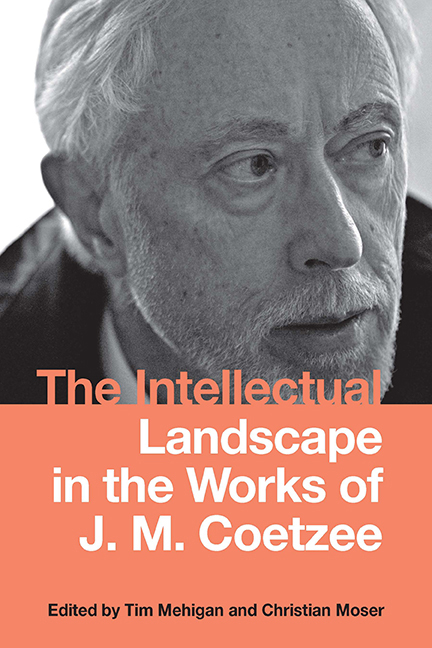Book contents
- Frontmatter
- Contents
- Acknowledgments
- Introduction: Coetzee's Intellectual Landscapes
- Part I Truth and Justification
- Part II Objectivity and Communication
- Part III Convergence of Interpretative Horizons and Moral Solidarity
- 11 Coetzee as Academic Novelist
- 12 Character and Counterfocalization: Coetzee and the Kafka Lineage
- 13 J. M. Coetzee's South African Intellectual Landscapes
- 14 Philosophical Fiction? On J. M. Coetzee's Elizabeth Costello
- 15 Cosmopolitanism, the Range of Sympathy, and Coetzee
- Notes on the Contributors
- Index
12 - Character and Counterfocalization: Coetzee and the Kafka Lineage
from Part III - Convergence of Interpretative Horizons and Moral Solidarity
Published online by Cambridge University Press: 03 July 2019
- Frontmatter
- Contents
- Acknowledgments
- Introduction: Coetzee's Intellectual Landscapes
- Part I Truth and Justification
- Part II Objectivity and Communication
- Part III Convergence of Interpretative Horizons and Moral Solidarity
- 11 Coetzee as Academic Novelist
- 12 Character and Counterfocalization: Coetzee and the Kafka Lineage
- 13 J. M. Coetzee's South African Intellectual Landscapes
- 14 Philosophical Fiction? On J. M. Coetzee's Elizabeth Costello
- 15 Cosmopolitanism, the Range of Sympathy, and Coetzee
- Notes on the Contributors
- Index
Summary
Disgrace and Counterfocalization
THE QUESTION OF CHARACTER has not received a great deal of attention in recent decades, other than in more strictly narratological studies. All the more reason, then, to welcome John Frow's new book, Character and Person, which ranges richly over a number of topics and literary examples to offer a nuanced account of the operation of character in fiction, making clear the dialectical relation between our construction of characters as we read and our construction of each other, as persons, in our daily lives. One thread that runs through Frow's discussion is the connection between “thinking of characters as pieces of writing or imaging, and thinking of them as person-like entities.” “These two ways of thinking about character,” he adds, “are logically difficult to hold together; and yet we do so in our every encounter with fictional character” (25). Our pleasure in reading a novel, that is, lies simultaneously in a willing suspension of disbelief whereby we respond to characters as if they had lives beyond the words in which they are conveyed to us and in an appreciation of the writer's handling of language and generic conventions in such a way as to create this illusion.
The question of character is at the heart of a recent disagreement between two acute readers of Disgrace, Gayatri Spivak and Simon During, the former in her mammoth volume An Aesthetic Education in the Time of Globalization and the latter in a PMLA forum on that volume. The disagreement arises in connection with a facet of the novel that has garnered a great deal of commentary: Lucy Lurie's refusal to lay charges against the three men who have raped her, or even to fully explain her refusal to her father—a silence which has the consequence that as readers we, too, are kept in ignorance of her motivation, since Coetzee's fictional mode allows us no information beyond what David Lurie knows. (Lucy is not literally silent, of course, but much of her thinking in the wake of the rape remains obscure to her father and thus to the reader.) Spivak embraces the narratological concept of “focalization” to discuss this feature of the novel, taking the term from Mieke Bal, who herself adopts it from Gérard Genette.
- Type
- Chapter
- Information
- The Intellectual Landscape in the Works of J. M. Coetzee , pp. 254 - 273Publisher: Boydell & BrewerPrint publication year: 2018
- 15
- Cited by

